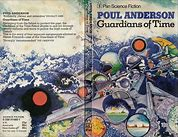-Poul Anderson, "Delenda Est" IN Anderson, Time Patrol (Riverdale, NY, 2010), pp. 173-228 AT 3, p. 187.
"'Apparently only a relative few entered [the alternate future], including you. Why not many? After all, in the course of the ages -'"
-The Shield Of Time, PART SIX, 18,244 B. C., II, p. 304.
Everard returned from the Oligocene to the 1954 from which he had departed but, later in his career, he returned from the Pleistocene not to the 1960 from which he had departed but to the equivalent year in an alternative timeline. What determines whether a time traveller returns to his original timeline or to an alternative/altered/divergent timeline? Is it just random? Some altered timelines result from random quantum fluctuations but others from extratemporal interventions. Let us construct a scenario.
Time Patrol agent A travels from 2000 to 1500 and returns. He deposits his timecycle in the Patrol warehouse. Next, agent B uses that same timecycle. A time criminal kills B and steals the timecycle. Using the stolen timecycle, the criminal alters history in 1499. Patrol agent A, using a different timecycle, travels to 1300 and returns. This time, A returns to an altered timeline. This is a time travellers' causal sequence outside of linear historical causality.
Everard tries to answer the "Why not many?" question:
"'Those were just the ones who happened to cross the crucial moment, bound uptime, in that larger section of time during which there were related events, like the Patrol's salvage work.'"
-The Shield Of Time, p. 304.
Every time traveller bound uptime crosses the crucial moment and passes through the period when there were related events. (Or do they "pass through"? Timecyles merely disappear from one set of spatiotemporal coordinates and appear at another.)
Everard continues:
"'We've got a longer section now, with a lot more traffic in it, so our problem is correspondingly bigger.'" (ibid.)
Is it a longer section? A change in the Middle Ages is later than a change in the Punic Wars. But Everard and Van Sarawak were at the lodge several years later than Everard is when he is discussing this. When is he dating his "sections of time" from? Everyone who travels through these sections of time does not wind up in an altered timeline.
Finally, Everard acknowledges:
"'I hope you understand what I'm saying. I don't.'" (ibid.)
And Komozino closes off discussion with:
"'It requires a metalanguage and metalogic accessible to few intellects... We haven't time to quibble about theory.'" (ibid.)
The Shield Of Time has taken the discussion considerably further than "Delenda Est" but eventually has run out of steam. Another Time Patrol novel could have taken it still further.

3 comments:
Repeated time travel gives writers plot-headaches.
And spare a thought for the readers.
Kaor, to Both!
And I empathized with Everard's "Don't ask me why"! Like him, I don't claim to understand mutable time paradoxes.
Ad astra! Sean
Post a Comment